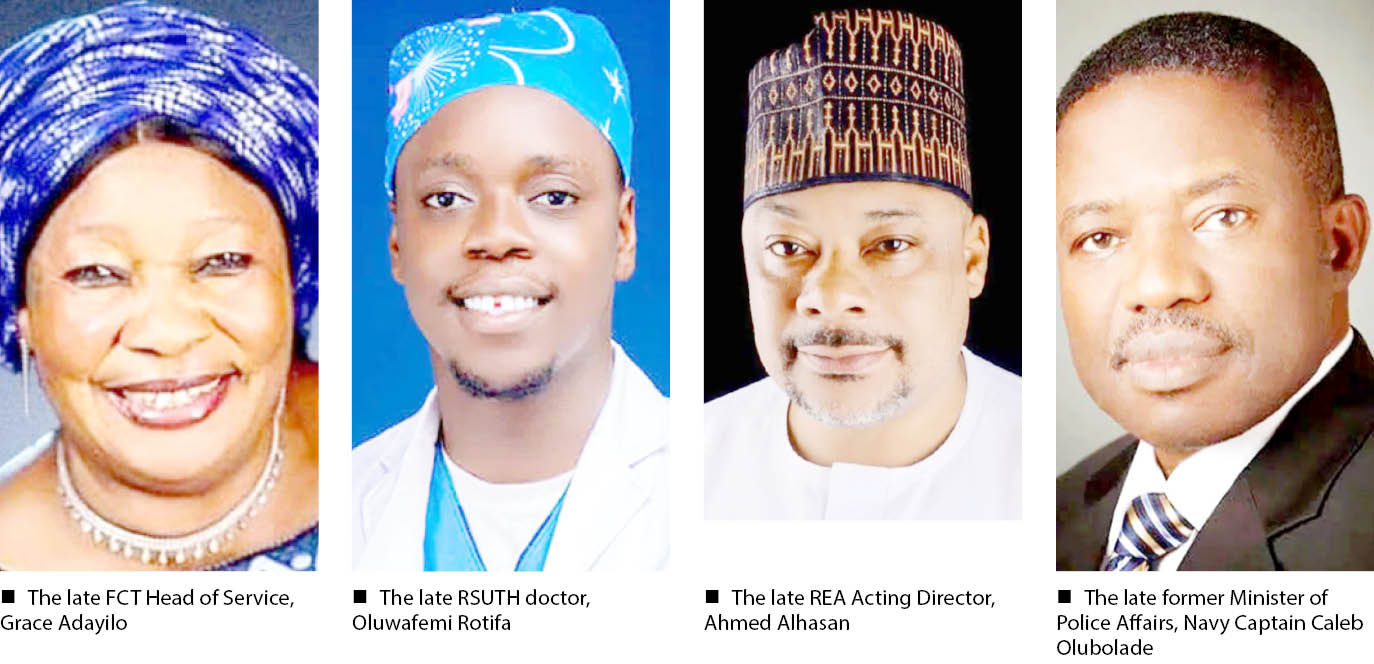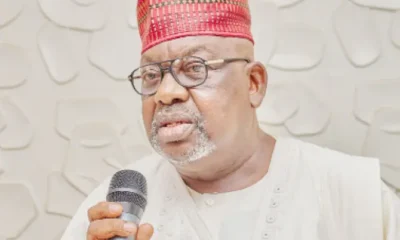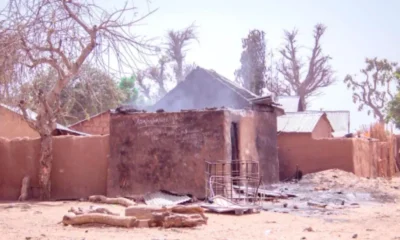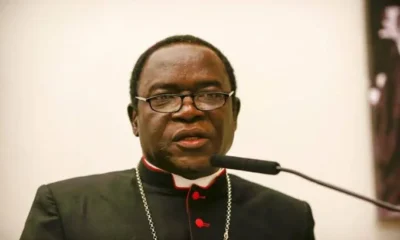News
Sudden Deaths Rise

Medical experts in Nigeria have raised the alarm over the rising cases of people suddenly collapsing, sometimes without prior warnings or signs.
Although there are no official records on the number of sudden deaths in the country, public information in the media space indicates rising cases.
Checks by Daily Trust showed that in the last nine months, many Nigerians, young and old, including ordinary citizens and public figures, had collapsed and died.
Casualties have been recorded among students, traders, academics, athletes and farmers as well as serving and retired government officials, among others.
While some of the victims died immediately they slumped, others were rushed to hospitals where doctors pronounced them dead on arrival.
These tragic incidents have been reported in homes, farms, offices, markets, football fields and even places of worship, sparking concerns across the country.
Various medical experts, including cardiologists, who were approached by Daily Trust for comments, linked most of the cases of sudden deaths to undiagnosed conditions, poor lifestyle choices and delayed emergency responses.
They advised Nigerians to take warning signs seriously, pay attention to their bodies and adopt healthier habits.
They said that with greater awareness, timely medical checks and emergency preparedness, many of these sudden deaths could have been avoided.
Some of the doctors called on governments to subsidise the costs of drugs for ailments that predispose citizens to sudden death.

Federal Ministry of Health Building
Some recent cases
On Wednesday, last week, an acting Director at the Rural Electrification Agency (REA), Dr Ahmed Alhassan, reportedly slumped and died during the agency’s stakeholders’ roundtable with Akwa Ibom State officials.
The same day, a 47-year-old trader, identified as Mrs. Comfort Abednego, collapsed and died around 11.20am at the Kwaita village market in the Kwali Area Council of the Federal Capital Territory. She was said to have slumped while she was attending to customers who came to buy garri (cassava flour) from her.
On September 3, 2025, a young resident medical doctor at the Rivers State University Teaching Hospital, Port Harcourt, Olowafemi Rotifa, slumped and died after a 72-hour call duty. Witnesses said he had been on continuous call duty for three days in the Emergency Room before retreating to the call room to rest, where he slumped and later died despite efforts to resuscitate him in the Intensive Care Unit.
In the early hours of Monday, September 1, 2025, the pioneer Head of the Civil Service of the Federal Capital Territory (FCT), Mrs Grace Adayilo, reportedly slumped and passed away.
On Friday, September 5, 2025, a 56-year-old Egyptian national, Mohammed Saleh, lost his life after reportedly slumping at a hotel in the Wuse Zone 4 area of the FCT, Abuja. His death was said to have occurred while he was having dinner with three other people at the Abuja Intercontinental Hotel.
In August, the assistant Coach of THE Shooting Stars Sports Club, Akin Olowokere, collapsed and died during training in Ibadan, the capital of Oyo State.
Also in August, there was a report of the death of a 47-year-old Chinese national, Luo Mao, who collapsed on duty at a ceramics company in Kogi State where one Chief James Aiyepeku, father of a murdered photojournalist, also died after collapsing.
The chairman of the Fulani vigilantes in the FCT, Ibrahim Adamu, reportedly collapsed and died at his residence; just as a media expert in Anambra, Comrade Chuma-Odili, also lost his life after slumping at a public function.
On Tuesday, July 29, 2025, a middle-aged man, identified as Joseph Ayuba, slumped and died while separating a couple who were fighting in the Dogon-Ruwa community in Abaji Area Council of the FCT.
Earlier same month, a woman identified as Mama Asabe reportedly died after collapsing on her farm in the Kigbe community; Yebu ward of Kwali Area Council of the FCT.
On June 23, 2025, a member of the IBB International Golf and Country Club and former Pioneer Director-General of the Nigerian Mining Cadastre Office, Engr Mohammed Amate, passed away while playing golf at the Zuma Golf Club, part of the Zuma Rock Resort located near Zuma Rock in Niger State, just outside Abuja. He was said to have collapsed on the 17th hole, and despite efforts to revive him, he was pronounced dead at the scene.
Also in June, the secretary of the All Progressives Congress (APC) in Gwargwada Ward, Kuje Area Council of the FCT, Abdullahi Bala, died after collapsing on his way home from the farm.
In the same month, an engineering student at Covenant University, Mordi Nwense Daniel, died while playing football; while a man identified as Yusuf Saleh Ashafa collapsed and died at an election venue at Abaji town in Abaji Area Council of the FCT.
On May 11, 2025, a former Bayelsa State military administrator and ex-Minister of Police Affairs, Caleb Olubolade, passed away at age 70 after collapsing at a lawn tennis facility in Apapa, Lagos State.
On May 13, a female broadcast journalist at Ogun State Television (OGTV), Mrs. Bukola Agbakaizu, died after collapsing while preparing for her afternoon shift.

On April 28, 2025, Keke rider slumped and died at PTI junction on the East-West road in Uvwie Local Government Area, Delta state.
In March 2025, a man identified as Abdulrasheed Usman collapsed and died while breaking his Ramadan fast in Gwagwalada, Abuja; while a 68-year-old man, Elisha Baba Sunday, also died while working on his farm in Kuje.
On Wednesday, March 2015, a professor at Obafemi Awolowo University, Ile-Ife, Osun State, Jimoh Olanipekun, reportedly slumped and died during a departmental meeting.
Also in March, Salihu Byezhe, a 52-year-old, died after collapsing during Subhi prayers in Gudaba village, Abuja; while a 31-year-old man, Ajayi Nicholas, was reportedly to have also slumped and died in a room at Gwagwalada.
In February 2025, a trader identified as Ifeanyi died after collapsing during an altercation with a fellow trader in Abuja.
Also in February, retired Major General Chris Jemitola, who was a former Aide-de-Camp (ADC) to ex-President Olusegun Obasanjo, collapsed at the IBB Golf Club in Abuja and was pronounced dead at a hospital; while a 43-year-old man, Danjuma Abraham, also died after collapsing in his bathroom at Gwagwalada the same month.
On January 16, 2025, a 29-year-old footballer, Adewale Adeyemi, representing the Ilesa West Local Government Area football team, passed away after collapsing during the Adeleke Memorial Cup Final in Osogbo, the capital of Osun State.
Victims’ last moments
Usman Yakubu, a relative to the chairman of the late Fulani vigilantes in the FCT, Ibrahim Adamu, said he slumped when he was preparing to attend a security meeting in Abuja.
He said the deceased had just returned home after withdrawing money from a Point of Sale (PoS) operator before he suddenly collapsed.
“He was immediately rushed to a nearby clinic where he was confirmed dead,” Yakubu recounted.
On the death of former Minister Olukolade, his daughter, Oluwayemisi Akinadewo and son, Dayo Olubolade, in a statement, explained that: “He drove himself to the facility to play lawn tennis in the evening and slumped while playing. Efforts were made by medical officers around to revive him to no avail.
“He was immediately rushed to Obisesan Naval Medical Hospital, Apapa, where he was pronounced dead.”
On the death of Oluwafemi Rotifa, the young resident medical doctor at the Rivers State University Teaching Hospital, the president of the Nigerian Association of Resident Doctors (NARD), Dr Tope Osundara, described the incident as a result of exhaustion and overuse of manpower.
“He was the only doctor on duty in the emergency room and had been on call for 72 hours. The overuse of manpower and exhaustion killed him. This was a death on duty,” he said.
Health experts speak
In separate interviews with Daily Trust, medical experts advised that many of these incidents are preventable if people heed warning signs, manage risk factors, and improve emergency response.
Dr Abbas Ibrahim, a cardiologist, said: “Heart attacks, which happen when blood flow to parts of the heart is blocked, remain a leading cause of people collapsing without warning.” He noted that some individuals have underlying conditions such as hypertrophic cardiomyopathy (thickening of the heart muscle), uncontrolled hypertension, high cholesterol, and diabetes. “Stress—psychological, financial, or physical—can trigger arrhythmias (irregular heart rhythm) that may prove fatal if untreated,” he added.
Dr Bello Yunusa, a physician, emphasized that sudden death is not always due to heart issues alone. “When people collapse and die, it is not only the heart that can be responsible—in fact, the brain has a lot to do with it. People can have strokes and become unconscious and even die,” he explained. He noted that damage to blood vessels, leading to haemorrhagic or ischemic strokes, can be extremely dangerous.
Another physician, Dr Muhammed Alausa, warned about “silent” cardiac conditions like hypertrophic cardiomyopathy, particularly in young people involved in vigorous exercise. He stated that these conditions can cause heart failure or sudden arrhythmias that go unnoticed until a person collapses.
A public health physician, Dr Aluko Michael, linked many sudden deaths to poor lifestyle choices and ignorance of warning signs. He noted that people often ignore symptoms like chest pain, irregular heartbeats, and dizziness until they collapse. “If a patient has pains in the arm and left side of the chest, there is a threat of death. I advise people to always check their pulse regularly,” he said.
Unseen dangers and preventive steps
Dr. Oladimeji Adebayo, a consultant cardiologist at the University College Hospital (UCH), Ibadan, and a Research Fellow at the Institute of Cardiovascular Disease, stated that the causes of sudden collapse and death are “multifaceted,” with cardiovascular diseases being the leading factor.
He explained that these diseases can manifest as coronary artery disease, electrical abnormalities (arrhythmias), heart muscle diseases (cardiomyopathies), heart attacks, cardiac arrest, and stroke. “These conditions often result from poor lifestyle choices, such as a sedentary lifestyle, smoking, and excessive alcohol consumption,” he said. Dr. Adebayo also noted that not adhering to medications for hypertension and diabetes increases the risk.
He highlighted other contributing factors: “Underlying medical conditions, like hypertension or heart disease, without showing symptoms can also lead to sudden death if left untreated. Excessive consumption of illicit substances, such as opioids and cocaine, as well as a family history of heart disease or sudden death, can increase an individual’s risk.” He also mentioned environmental factors like heat stroke and dehydration.
To prevent sudden death, Dr. Adebayo urged Nigerians to be proactive about their health.
- Know your numbers: He emphasized the importance of monitoring blood pressure, cholesterol, and blood sugar levels to identify potential health risks. “By knowing your numbers, you can take proactive steps to manage your health,” he said.
- Embrace a healthy lifestyle: He recommended regular health check-ups, regular exercise, a balanced diet, and stress management to reduce the risk of cardiovascular disease.
- Avoid substance abuse: “Avoiding substance abuse is crucial, as limiting or avoiding illicit substances can reduce the risk of sudden death,” he said, also encouraging stress reduction techniques like meditation and deep breathing.
- Pay attention to warning signs: Dr. Adebayo stressed the importance of taking warning signs seriously. “Paying attention to warning signs like chest pain, shortness of breath, fainting, or dizziness, and seeking medical attention if you experience any of these symptoms is vital,” he advised. He also suggested that those with a family history of heart disease should be proactive and discuss their risks with their doctor.
Doctors want medications subsidised
Dr Abass Ajadi Tijani, a neck surgeon and head of the Otorhinolaryngology Department (ENT) at the Federal University of Health Sciences Teaching Hospital, Azare, Bauchi State, in a chat with Daily Trust last night, implored the federal and state governments to subsidise essential medications for chronic conditions such as hypertension, diabetes, malaria and other diseases that significantly predispose citizens to sudden death.
“Every day in clinical practice, we encounter patients who are diagnosed with these conditions, but due to financial constraints, they cannot afford essential medications for their conditions.
“This financial barrier leads to poor adherence, uncontrolled disease progression and, tragically, avoidable complications such as myocardial infarction (heart attack), stroke, kidney failure, diabetic complications and sudden death,” Dr Tinaji said.
Similarly, Dr Teslim Isiaka of the University College Hospital, Ibadan, said there had been a surge in the number of sudden deaths among Nigerian youths, especially in those less than or around the age of 40 years.
According to him, “This is attributable to a lot of factors, especially an alarming increase in the incidence of diseases which hitherto were not common in this age group.
“It is high time the Nigerian government rose up to nip this in the bud. There is a causal relationship between these avoidable deaths and increase in the incidence of non-communicable diseases such as hypertension, diabetes mellitus, and others.
“I strongly recommend that the Nigerian government at all levels help in this regard by subsidising the cost of medications for the management of hypertension, diabetes mellitus, hypercholesterolemia and others.” (Daily trust)
-

 News23 hours ago
News23 hours agoTinubu Abroad 22 Days In 1 Month
-

 Politics23 hours ago
Politics23 hours agoKano Senator Orders Ex-NNPP Leaders To Return Vehicles After Defection To APC
-

 News23 hours ago
News23 hours agoConcerns As Banditry Creeps Into Gombe
-

 News2 hours ago
News2 hours agoBig money, small impact: Govs face fire over N9tn FAAC windfall
-

 Business21 hours ago
Business21 hours agoMay & Baker returns to profit; billionaire Danjuma family remains controlling shareholder
-

 News2 hours ago
News2 hours agoNo other country sees daily killings like Nigeria – Kukah
-

 News22 hours ago
News22 hours agoBREAKING: Sit-at-home crumbles in Onitsha Main Market as traders bow to Soludo, reopen shops
-

 Business2 hours ago
Business2 hours agoRefiners battle crude shortage as Nigeria exports 306m barrels


















